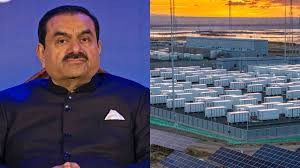Adani Airports Secures $750 Million Funding from Global Banking Consortium to Boost Expansion Plans
IIE DIGITAL DESK : Adani Airports Holdings Ltd (AAHL), a wholly-owned subsidiary of Adani Enterprises Ltd, has successfully raised $750 million through a strategic financing deal with a consortium of international banks. The funding marks a key milestone in the group’s ongoing efforts to enhance its airport infrastructure portfolio and improve operational efficiency across its expanding network of Indian airports.
The consortium that extended the funding includes several prominent global lenders such as Standard Chartered Bank, Barclays, Deutsche Bank, and JPMorgan Chase, among others. The deal is structured as a senior secured financing facility, with the capital expected to be deployed toward infrastructure upgrades, terminal expansion, and technology enhancement at several airports managed by Adani Airports.
Adani Airports currently operates seven major airports in India—Mumbai, Ahmedabad, Lucknow, Mangaluru, Jaipur, Guwahati, and Thiruvananthapuram—making it the largest private airport operator in terms of the number of airports managed. The latest infusion of funds comes at a time when the aviation sector is showing strong signs of post-pandemic recovery, with a rise in domestic and international passenger traffic.
According to a company statement, the $750 million will help optimize AAHL’s capital structure and provide financial flexibility to accelerate its long-term vision of building world-class airport infrastructure. The company emphasized that the transaction not only reflects global investors' trust in Adani Group’s airport operations but also the resilience and growth potential of India’s aviation sector.
Jeet Adani, Director at Adani Enterprises and a key figure in the group’s infrastructure initiatives, welcomed the development as a landmark moment in the group’s financial journey. “This successful fundraise reinforces the trust of global investors in the Adani Group’s infrastructure strategy. The funds will support our goal of transforming airports into aviation hubs, enhancing passenger experience, and contributing to India’s overall infrastructure growth,” he said.
The financing deal is also being viewed as a reflection of international confidence in the Indian government's emphasis on infrastructure-led growth. With the civil aviation ministry pushing for greater private participation and modernization of airport infrastructure, Adani Airports’ aggressive investment strategy is seen as complementary to the national goal of building a $5 trillion economy.
Market analysts believe the move will provide the group with the necessary financial bandwidth to invest in smart technologies, expand terminal capacities, and improve logistics at its airports. Several of Adani’s airports, including Mumbai’s Chhatrapati Shivaji Maharaj International Airport, are already undergoing modernization projects that aim to cater to growing air traffic demands and enhance the overall travel experience.
The group has also signaled interest in exploring international airport ventures, potentially leveraging its growing credibility in the global infrastructure market. While no formal announcements have been made, sources indicate that the group is actively evaluating opportunities in Southeast Asia and the Middle East.
The $750 million deal follows Adani Group’s broader financial strategy of partnering with global institutions to fund its infrastructure projects without over-leveraging its balance sheet. This approach has drawn positive responses from credit rating agencies, who view the latest transaction as a step toward long-term sustainability.
The deal comes amid heightened scrutiny over Indian conglomerates' financial dealings and their exposure to international markets. However, Adani Group officials emphasized that the latest fundraise underwent extensive due diligence and complies fully with international regulatory and financial transparency standards.
With air travel in India projected to witness exponential growth over the next decade, Adani Airports' latest capital infusion places it in a strong position to lead the sector's transformation. As India continues to invest in world-class infrastructure to support its economic aspirations, strategic deals like this are set to play a pivotal role in shaping the future of urban connectivity and global competitiveness.
You might also like!
















